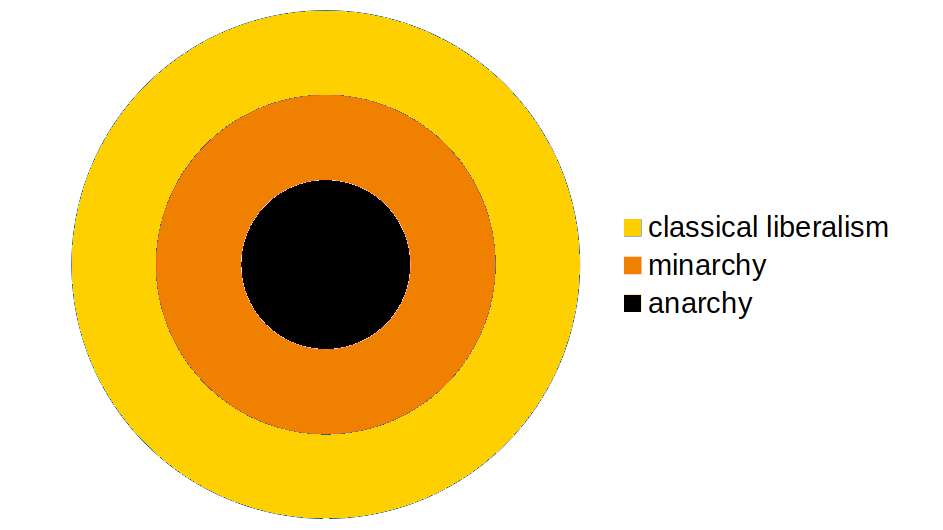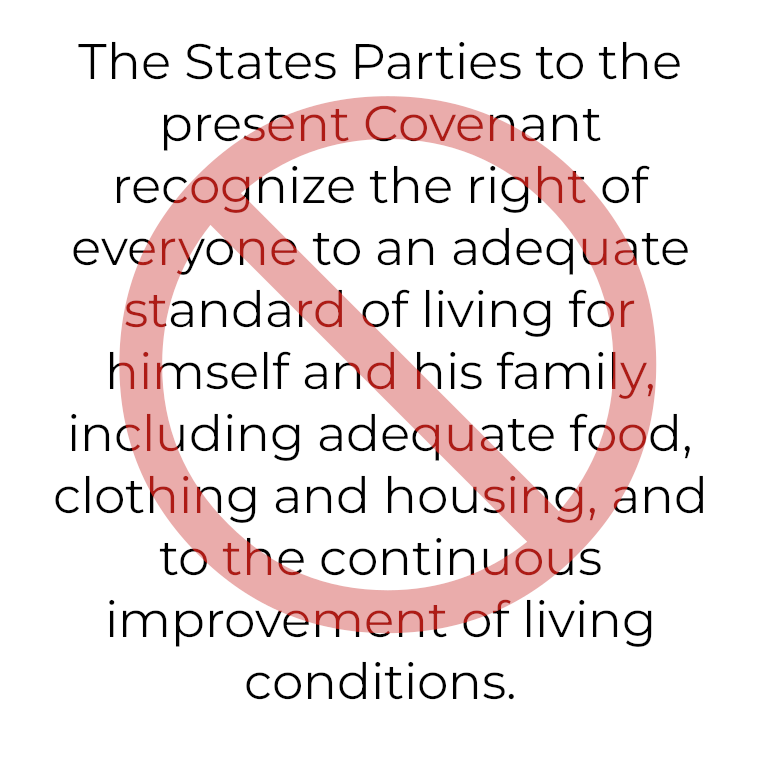Libertarianism
A political party needs a platform, serving as a formal statement of its goals and aspirations. Before I tell you what I like about the Libertarian Party platform, let's take a look at the platforms of the two major parties. For each one, I'll quote the first paragraph of the preamble along with one other illustrative snippet.
from the Democrat Party Platform:
...
President Biden, Vice President Harris, and Democrats are running to finish the job. ... To strengthen American leadership worldwide.
from the Republican Party Platform:
...
But now we are a Nation in SERIOUS DECLINE. Our future, our identity, and our very way of life are under threat like never before. Today we must once again call upon the same American Spirit that led us to prevail through every challenge of the past if we are going to lead our Nation to a brighter future.
I want to point out a couple of similarities between these two platforms. First, they both go on about what a great nation America is. The Democrats indicate our country deserves leadership worldwide. The Republicans say it's the Greatest Nation in the History of the World. Whatever principles either party may have, would they still apply in some other country? It's unclear.
Second, both platforms focus on what's happening today. The Democrats say we're now at an inflection point. The Republicans say we're now in serious decline. Whatever principles either party may have, will they still apply in 10 years? It's unclear.
In the case of the Democrats, the emphasis on current events led to an interesting situation: by the time the platform was adopted in August, it was no longer accurate because President Biden was no longer running to finish the job.
Okay, now let's look at the first paragraph of the Libertarian Party Platform preamble:
There's no mention of America here. In fact, if you read through this platform, you'll see it's not about America at all. For me that's a good thing. I don't want my political principles to be contingent on America being the greatest nation in the world, because quite frankly I don't know that it is. If you haven't already, please check out this famous clip from The Newsroom addressing the question. The show is fictional, but I encourage you to judge for yourself how much of what he says is true.
The platform includes a Statement of Principles, listing the rules we want to follow regardless of where we live. This section hasn't changed in 50 years, which is why our tag line is The Party of Principle. Here are the first two paragraphs:
We hold that all individuals have the right to exercise sole dominion over their own lives, and have the right to live in whatever manner they choose, so long as they do not forcibly interfere with the equal right of others to live in whatever manner they choose.
For the New Hampshire version of this platform, I'd remove any suggestion that we want to impose our platform on other states or other countries. So I'd replace any government with the government of New Hampshire.
Just How Small?

How small do libertarians want government to be? There are several types of libertarianism, each with its own answer to that question.
The smallest and most extreme flavor is anarchy, meaning no government at all.
The next larger size is minarchy, also called the night-watchman state, meaning a government whose only role is to provide military defense, police and a court system. This is the stated goal of the Free State Project.
Classical liberalism is the stated goal of the Libertarian Party. It allows several additional roles for government beyond what minarchy offers, such as public works and a stable currency. But it rejects the welfare state. The platform expresses its opposition to positive rights in section 3.5:
A few other flavors of libertarianism exist, such as voluntaryism and anarcho-capitalism. I won't say much about them here, except that they're smaller than classical liberalism.
The Mises Caucus is a faction within the Libertarian Party that advocates for paleolibertarianism, a strategy of working within the Republican Party to achieve Libertarian goals. Most of the current Libertarian Party of New Hampshire leadership belongs to the Mises Caucus, which discourages running Libertarian candidates for statewide and federal offices. Obviously, my campaign for governor runs counter to this strategy. But I'm hoping my campaign will encourage the Mises Caucus and traditional Libertarians to set aside their differences, and work together to build a libertarian society in New Hampshire.
A Society Without Positive Rights

We've seen that classical liberalism is the largest of the government sizes that could qualify as libertarian. But even this size is way too small for most people, because it excludes positive rights. Let's take a moment to understand why this is so controversial.
In 1966, the United Nations adopted the International Covenant on Economic, Social and Cultural Rights as its statement of positive rights. Part of Article 11 appears in the nearby image. The United States hasn't ratified this covenant, but the majority of member states have done so.
Clearly most of the world views welfare and other positive rights as vitally important. No matter how hard we tried to persuade them, most people would never want to be part of a libertarian society with no positive rights. They'd be terrified of it.
But with great effort, maybe we can convince people that it's reasonable for us to want such a society for ourselves. So I want to frame the absence of positive rights as our own preference, with no judgment of others.
When I articulate this preference for myself, the short version comes down to four words: nobody owes me food. It's a statement about me. I'm denying any obligation to me, without commenting on any duty to other people. In the next section we'll explore the longer version of this statement.
As controversial as it may be for us to deny our positive rights, it's critical for some of the freedoms we want. If government were expected to take care of us when we're in need, they'd have a vested interest in preventing us from making bad decisions, like taking drugs they consider dangerous. So if we want the freedom to ingest whatever we want into our bodies, we need to absolve the government of any responsibility for the consequences.
Nobody Owes Me Food

When I deny my positive right to food, here's what I'm really saying:
Nobody owes me food.
In order for me to receive food, normally some farmer needs to grow it, some truck driver needs to transport it to my town, and some grocer needs to make it available for me to purchase.
The farmer, the truck driver, and the grocer are not my slaves. They're not the government's slaves. Generally speaking, I need to make it worth their while to perform the labor involved in providing me with food.
The love of money is a fortunate thing. Specifically, I'm glad the farmer, the truck driver, and the grocer love money so much that they're willing to perform this labor while receiving only money in return. As a result, I don't need to barter directly with them. Instead, I can perform similarly valuable labor for someone else.
I know that someday I might become destitute, and I might no longer be able to afford my food. But even then, I don't expect or want the government to give me money to meet my needs. I know that in order to do that, the government would need to tax other people an extra amount. For me, it would be like stealing from those taxpayers.
Let's thoroughly examine the implications of the last paragraph, because that's where all the controversy lies. There's no denying it: I'm accepting a risk of death if voluntary charity isn't enough to sustain me. I'm effectively signing a waiver, like the one I might sign to go skydiving or trekking up Mount Everest.
But this waiver differs in one respect: if charity isn't enough, suicide likely becomes my only ethical option. Even though death is death, somehow taking my own life seems worse than plummeting to the ground due to a defective parachute, or freezing to death in the Himalayas because of bad weather.
Anyway, now suppose a lot of us sign this waiver saying nobody owes me food. If we concentrate ourselves in New Hampshire and become a majority here, we can enjoy the benefits of smaller government, including lower taxes.
Actually, our motivation for opting out of positive rights goes beyond just reducing taxes. We also seriously doubt the sustainability of the welfare state. Big governments can't seem to raise enough revenue from taxes to meet expenditures, so they need to borrow money. The debt to GDP ratio for the United States is now well above 100%. Other countries are facing the same problem: France, Germany, the UK, and all the other countries with large welfare states are chronically deficit spending.
If I accomplish nothing else with my campaign, I'd like the American people and world leaders everywhere to think long and hard about this question: is chronic deficit spending sustainable? Can the federal government, or any government, keep borrowing and borrowing forever?
The Libertarian view is that it can't, and it's wrong anyway. For us, deficit spending is like stealing from our grandchildren. Our platform makes this clear in section 2.5:
Nobody Owes Me Housing

Of course, I don't just need food. I also need a place to live, and I'm making a similar statement about that:
Nobody owes me housing.
In order for me to own a home, normally some carpenters, plumbers and electricians need to build the home. And they'll be needed for occasional repairs. These people are neither my slaves nor the government's slaves. Generally speaking, I need to make it worth their while to perform the labor involved in providing me with housing.
If I'm renting an apartment, I understand that the rent I pay needs to cover the landlord's expenses, including property tax and the cost of hiring carpenters, plumbers and electricians. The landlord is neither my slave nor the government's slave. Generally speaking, I need to make it worth the landlord's while to rent the apartment to me. I don't expect or want the government to force the landlord to rent an apartment to me at below the market rate.
Here I'm accepting the risk that I won't be able to afford the housing I want. I might need to move somewhere else, or I might need to share housing with some friends. But I'm pledging that I'll find a way to deal with the situation somehow.
Nobody Owes Me Health Care

Naturally, I also need health care. Here's what I have to say about that:
Nobody owes me health care.
In order for me to receive health care, normally some doctors, nurses and other medical personnel need to provide it to me. These people are neither my slaves nor the government's slaves. Generally speaking, I need to make it worth their while to perform the labor involved in providing me with health care. I don't expect or want the government to force medical personnel to provide me with health care at below the market rate.
Here I'm accepting the risk that I won't be able to afford the health care I need. To mitigate this risk, I'll most likely purchase health insurance, and I expect to pay market rate for that too.
The Government Doesn't Owe My Child An Education

Suppose Alice and Bob are a libertarian couple, and Johnny is their son. Here's what Alice might have to say about Johnny's education:
Bob and I have a duty to provide an education for Johnny. It's part of our obligation as parents.
Nobody else owes Johnny an education.
In order for Johnny to receive an education, normally some teachers need to educate him. These teachers are neither my slaves nor the government's slaves. Generally speaking, Bob and I need to make it worth their while to perform the labor involved in educating Johnny.
I don't expect or want the government to pay for Johnny's education. I know that in order to do that, the government would need to tax other people an extra amount. For me, it would be like stealing from those taxpayers.
This situation is a little different from the earlier ones. If I fail to earn my food, housing or health care, the consequences fall on me. But if Alice and Bob fail to provide an education for their child, it's Johnny who suffers. Of course, Johnny will also be hurting if his parents don't provide him with food and health care.
Clearly it needs to be part of our libertarian culture that we take our parental obligations very seriously. If for any reason Alice and Bob become unable to support Johnny, they'll need to find someone else who can.
Note that in order for us to begin winding down the positive right to an education, we'll need to amend the New Hampshire constitution as described on the Article 83 page.
